
- Average Rating:
- Not yet rated
- Topic Areas:
- Workshops | Children and Adolescent Therapy | Psychotherapy | Anxiety | Hypnosis | Post-Traumatic Stress Disorder (PTSD) | Self-Esteem
- Categories:
- Erickson Congress | Erickson Congress 2007
- Faculty:
- Susy Signer-Fischer, Lic. Phil. Psych
- Duration:
- 1:53:27
- Format:
- Audio Only
- Original Program Date:
- Dec 07, 2007
- Short Description:
- Self-esteem, self-confidence and self-concept are closely connected with the development of human identity. The enhancement of self-esteem and identity formation can be used effectively in psychotherapy with children, especially in the treatment of anxiety disorders, depression, post-traumatic stress disorder and many other social difficulties. Hypnotic interventions proved to be effective in working with children and adolescents on an individual basis.
- Price:
- $15.00 - Base Price
Tags: Anxiety Hypnosis PTSD Self-Esteem
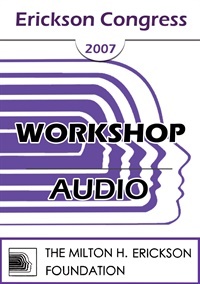
- Average Rating:
- Not yet rated
- Topic Areas:
- Workshops | Ericksonian Hypnosis and Therapy Techniques | Gestalt | Hypnosis
- Categories:
- Erickson Congress | Erickson Congress 2007
- Faculty:
- Raquel Azses, MS
- Duration:
- 1:43:18
- Format:
- Audio Only
- Original Program Date:
- Dec 07, 2007
- Short Description:
- An ego state may be defined as an organized system of behavior and experience. When one of these states is invested with ego energy, it becomes “the self” in the here and now. Ego states can block resolutions for therapy success because they do not normally become open and observable. Detecting and revealing the ego states that are blocking the therapeutic process is the first step in collaborating with the patient, changing the resistance to resources, evolving the ego states and giving the patients better control of themselves. Therapeutic goals are achieved by using a combination of Ericksonian Hypnosis and Gestalt Techniques.
- Price:
- $15.00 - Base Price
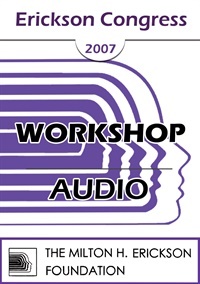
IC07 Workshop 26 - Indirect Suggestions & Therapeutic Binds in Hypnosis - Stephen Lankton, MSW, DAHB
- Average Rating:
- Not yet rated
- Topic Areas:
- Workshops | Ericksonian Hypnosis and Therapy Techniques | Hypnosis | Binds | Indirection | Language of Hypnosis | Suggestion
- Categories:
- Erickson Congress | Erickson Congress 2007
- Faculty:
- Stephen Lankton, MSW
- Duration:
- 1:53:33
- Format:
- Audio Only
- Original Program Date:
- Dec 07, 2007
- Short Description:
- This technique is among the most crucial to good therapy. Participants will be guided through several exercises to help them learn and practice the construction of six forms of indirect suggestions and four forms of binds. A demonstration using these forms will illustrate the implementation of this set of language techniques for the induction and treatment process. The use of indirect suggestions in further treatment will be outlined.
- Price:
- $15.00 - Base Price
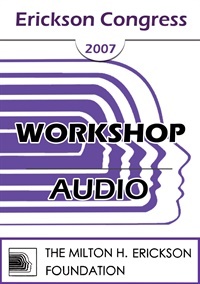
- Average Rating:
- Not yet rated
- Topic Areas:
- Workshops | Hypnosis | Law & Ethics
- Categories:
- Erickson Congress | Erickson Congress 2007
- Faculty:
- Alan Scheflin, JD
- Duration:
- 1:52:29
- Format:
- Audio Only
- Original Program Date:
- Dec 09, 2007
- Short Description:
- Clinicians who practice hypnosis must be familiar with its legal and ethical boundaries. In recent years, courts have paid increasing attention to the clinical and forensic use of hypnosis. Many lawyers have targeted hypnosis as what they call an “experimental and dangerous” type of treatment. We will discuss how therapists may simultaneously protect the legal rights of their patients, and may protect themselves from lawsuits. In addressing current clinical concerns, we will examine the rich and colorful history of hypnosis as it relates to law.
- Price:
- $15.00 - Base Price
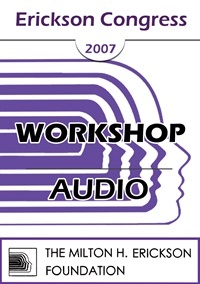
- Average Rating:
- Not yet rated
- Topic Areas:
- Workshops | Hypnosis | Psychology | Psychotherapy | Strategic Therapy
- Categories:
- Erickson Congress | Erickson Congress 2007
- Faculty:
- John Beahrs, MD
- Duration:
- 1:53:36
- Format:
- Audio Only
- Original Program Date:
- Dec 09, 2007
- Short Description:
- Many strategic therapists eschew theory and sacrifice grounding. Missing theory resides in basic sciences. Hypnosis data reveal consciousness and volition as paradoxes, resolvable through evolutionary biology. Human's minds evolved as shared self-deceptions. Theory can predict transference, paradox, game antitheses, Erickson's "common sense psychology," but it constrains their optimum utilization.
- Price:
- $15.00 - Base Price
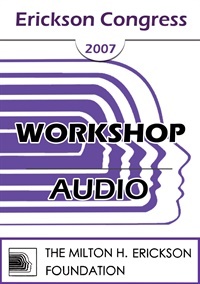
- Average Rating:
- Not yet rated
- Topic Areas:
- Workshops | Meditation, Spirituality and Yoga | Hypnosis | Gender | Femininity
- Categories:
- Erickson Congress | Erickson Congress 2007
- Faculty:
- Lilian Borges, MA, LPC | Marilia Baker, MSW | Consuelo Casula, Dipl. Psych | Betty Alice Erickson, MS, LPC, LMFT | Teresa Robles, MA, PhD
- Duration:
- 1:51:28
- Format:
- Audio Only
- Original Program Date:
- Dec 09, 2007
- Short Description:
- We all have a feminine part and a masculine part, both yin and yang. Whereas the masculine part helps us to control things, analyze things, and make things happen in the world, the feminine part is our guide to, and the connection with our soul. We need ways to resonate with our feminine side in order to have direction, meaning and purpose, and to fulfill our mission in life. This workshop will address how hypnosis and some other strategies can be used to help us resonate with the feminine in our lives.
- Price:
- $15.00 - Base Price
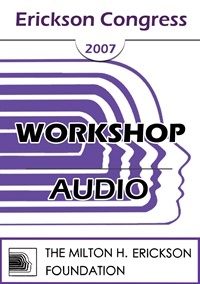
- Average Rating:
- Not yet rated
- Topic Areas:
- Workshops | Cognitive Behavior Therapy (CBT) | Hypnosis | Obsessive Compulsive Disorder (OCD)
- Categories:
- Erickson Congress | Erickson Congress 2007
- Faculty:
- Krzysztof Klajs, Dipl. Psych
- Duration:
- 1:44:09
- Format:
- Audio Only
- Original Program Date:
- Dec 09, 2007
- Short Description:
- OCD affects an estimated 2-3% of the adult population and is recognized by therapist as a difficult and long-lasting disorder. A number of useful strategies for working with OCD will be presented in this session, including the combination of hypnosis with cognitive behavioral strategies in reaction prevention and implosive approaches. Systemic ideas for increasing effectiveness of therapy will be stressed. Time will be allowed for participants to discuss the emotional reactions typically experienced while working with OCD patients.
- Price:
- $15.00 - Base Price
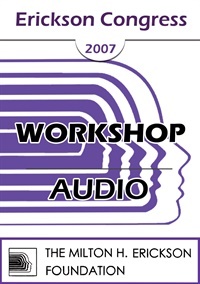
- Average Rating:
- Not yet rated
- Topic Areas:
- Workshops | Ericksonian Hypnosis and Therapy Techniques | Hypnosis | Trance | Utilization
- Categories:
- Erickson Congress | Erickson Congress 2007
- Faculty:
- Eric Greenleaf, PhD | Betty Alice Erickson, MS, LPC, LMFT
- Duration:
- 1:53:02
- Format:
- Audio Only
- Original Program Date:
- Dec 09, 2007
- Short Description:
- This workshop will include demonstrating a smorgasbord of opportunity to engage the patient - the problem, the trance, and solutions; Interviewing for a sense of experiential style, idiosyncratic language and learned skills; Utilizing repeated trances of different sorts by each presenter with a volunteer. This will be interspersed with discussion and practice sessions for participants.
- Price:
- $15.00 - Base Price
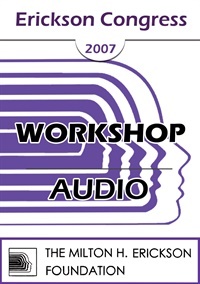
- Average Rating:
- Not yet rated
- Topic Areas:
- Workshops | Consciousness | Hypnosis
- Categories:
- Erickson Congress | Erickson Congress 2007
- Faculty:
- Philip Accaria, PhD | Philip Appel, PhD
- Duration:
- 1:34:10
- Format:
- Audio Only
- Original Program Date:
- Dec 09, 2007
- Short Description:
- In this workshop the presenters will address the use of clinical intuition across the different sensory modalities when interacting with a client as a complex energy system. Participants will learn how to access their intuition and how to change the consciousness and energetics of the client through the use of trance. Participants also will learn how the "healer" can walk between the worlds of evidence-based medicine and the energetic realms by employing the use of trance states.
- Price:
- $15.00 - Base Price
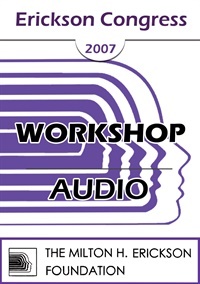
- Average Rating:
- Not yet rated
- Topic Areas:
- Workshops | Hypnosis
- Categories:
- Erickson Congress | Erickson Congress 2007
- Faculty:
- Michael Yapko, PhD
- Duration:
- 1:33:32
- Format:
- Audio Only
- Original Program Date:
- Dec 09, 2007
- Short Description:
- The power of expectations to influence both the onset of symptoms as well as the quality of clinical response to treatment is will established in the literature. In this workshop, we will explore how expectancy influences experiences of all types, and how hypnosis can be used to help establish positive expectancy of treatment success.
- Price:
- $15.00 - Base Price
Please wait ...

